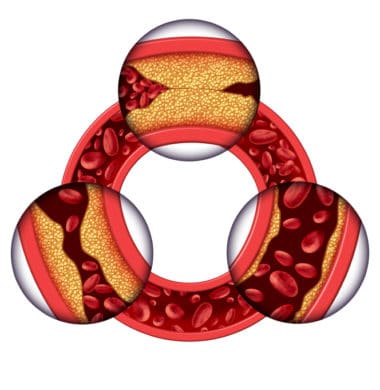What Causes Heart Disease I: Atherosclerosis and Arteriosclerosis

When asking, “What causes heart disease,” there are a few things you need to consider. First and foremost is what exactly heart disease is. Simply put, heart disease is, “an illness to veins, arteries, capillaries, and the heart.” Predominantly speaking, there are two types of heart disease that are caused by the buildup of fatty plaque: atherosclerosis and arteriosclerosis. Generally speaking, these two ailments often occur simultaneously. The former is caused by “a buildup of fatty plaques in the arteries that can block oxygen and other nutrients to and from your heart and the rest of your body” and the latter is a, “Restriction of blood flow to your organs and tissues. Atherosclerosis is the most common form of cardiovascular disease and is often caused by an unhealthy diet, lack of exercise and smoking.” The two are often used interchangeably because technically, atherosclerosis is a type of arteriosclerosis. If atherosclerosis was the catchall for all heart disease that is caused by fatty plaque, arteriosclerosis is a symptom that manifests as a restriction of blood flow to your organs and tissues. Poor blood flow can cause organ failure which often has high mortality rates without a transplant. The point is, your heart exists to pump blood throughout your body and filter out the used blood, and if that process becomes backed up it can lead to a whole slew of issues.
So what causes fatty plaque? More than anything it’s a poor diet composed of significant traces of saturated and trans-fats, which have a tendency of raising low-density cholesterol and lowering high-density cholesterol, known colloquially as bad and good cholesterol, respectively. The more of these fats you eat, the more LDL cholesterol accumulates in your arteries. HDL cholesterol is important because they remove the fats accumulating in your arteries, while LDL cholesterol causes buildups in your arteries that can rupture and leave behind fatty plaque which is difficult for your body to remove. The more frequently this occurs, the more likely you are of developing coronary heart disease. Your diet isn’t the only contributor to this problem. Smoking and a lack of exercise have also been known to cause these buildups. Conversely, a smoke-free lifestyle and a moderate amount of exercise have been known to actually increase HDL cholesterol levels which are essential to regulating LDL levels. Even eating a balanced diet has been proven to lower LDL levels. A high-fiber, low-fat diet is incredibly helpful at lowering LDL levels. It is believed that this is because fiber, which is simply indigestible by the body, attaches to LDL cholesterol in the small intestine rendering it too to be indigestible. Fiber does incredible things for your body and there’s a reason most doctors request that you add more to your diet if you can.
How To Use This Information
Heart disease is scary, and there are many types that are caused by different things. Atherosclerosis and arteriosclerosis are just two common types that plague many Americans. Next time we will discuss the causes of another common heart ailment: Heart Arrhythmia. For more information on what causes heart disease, visit our FAQ. If you are concerned about your heart health, do not hesitate to request an appointment with one of our cardiologists by calling us at 303-744-1065, or visit our website.
- 9 Tips to Reduce Holiday Stress - December 11, 2025
- 6 Tips for Exercising Outdoors with a Heart Condition - May 19, 2025
- Lifestyle Changes That Can Help Manage Arrhythmia - April 30, 2025
Sign Up
As with any health concerns, your specific treatment program should be discussed thoroughly with your primary care physician as well as any specialists who may need to be consulted – like a cardiologist.
Sign Up
